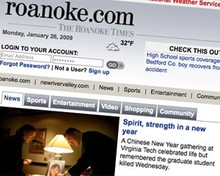
Yet their use by news organisations can lead to a blurring of the personal and professional for journalists.
US paper The Roanoke Times is no exception: last month editor Carole Tarrant was asked by some newsroom staff if the title's standards and ethics policy needed updating on this issue.
While other groups have taken strong action, banning journalists from using networking sites and implementing guidelines for using social media in reports, the Times' worked virtually with industry group The Poynter Institute to establish a new code of practice for social media.
"The timing was good because I had grown somewhat concerned during the 2008 presidential campaign because I was seeing journalists join pro-Obama groups on Facebook. A friend had posted a 'Yeah, Obama!' kind of comment on my wall on election night, and I knew I had an awkward personal/professional situation on my hands," Tarrant tells Journalism.co.uk.
The new guidelines include confirming online information offline, managing personal comments and profiles on social networks and good linking practice when promoting content.
Above all journalists should be upfront about who they are, what they're after and where they got their information from, adds Tarrant.
"Social networking is still in its infancy and 'the rules' haven't been developed. Users still see it as an intimate place where they can share information they wouldn't otherwise," she says.
"As journalists we need to keep that in mind and, yes, get the facts but also leave a good impression. I don't want social networks to die off because they were abused by people who invaded our online 'space'."
Developing such rules in a working environment and in response to journalists 'who are neck deep in using social media' has helped make them practical, Kelly McBride, ethics group leader at The Poynter Institute, says.
"I think the most valuable part of this is that it was developed in a training session by the staff. They asked for it, they developed it and they will be the ones to use it," she says.
"A lot of other newsrooms will take these guidelines and attempt to use them. They'll find it's not as effective without the short amount of training that went with them. That's because the training urged a critical mass in the newsroom to develop a common experience, vocabulary and understanding around the issue."
Using social media to promote and distribute the Times' content has been part of the paper's strategy for two years, says McBride.
As such, the development of the new rules is focused on 'green light ethics': making the most of social media rather than the negatives, she says.
While Tarrant wants to encourage her staff to experiment with social media, discussing the ethical implications has helped many understand that social media isn't private.
"It's the nature of the internet - if you post it online, you might as well shout it in the town square or put it on a billboard on the interstate highway for the world to see," she explains.
The new guidelines haven't been formally implemented as yet, but are set for further development – in particular the policy on online diversity.
"The old assumption was the internet wasn't a diverse place and that if you used it as a reporting tool you'd only be talking to rich white folks. That's not the case anymore, as the digital divide - at least in wide swathes of America - is slowly being overcome."
Free daily newsletter
If you like our news and feature articles, you can sign up to receive our free daily (Mon-Fri) email newsletter (mobile friendly).
Related articles
- Journalists are happy to be disconnecting from platforms, should news organisations be worried?
- Protecting journalists on social media, with Valérie Bélair-Gagnon
- How to report on homicide and interview grieving families
- What will your audience want in the future?
- 15 free sources of data on the media industry









